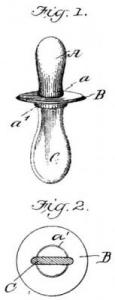On science blogs: Pacification
HUMAN MICROBIOME NEWS: PACIFIER DIVISION. Let us begin with that story about how sucking on your child's pacifier might keep her/him from developing allergies and eczema. The wonderful world of the human microbiome and what it does to keep us healthy and happy is very nearly my favorite topic, so I get the principle all right. If you suck a baby's pacifier and then give it back, you're transferring your oral microbes to the baby's mouth. It's the most recent iteration of the Hygiene Hypothesis of Allergy Development — the idea that too much infant cleanliness can keep a kid from learning to swim in the real-world ocean of microbes.
The first thing was to get my mind around the idea of sucking a kid's pacifier. To clean it? This turns out to be not uncommon, and I was flabbergasted. It would never have occurred to me. I probably rinsed my kid's pacifier off. I may even, horrors, have boiled it; my mind is a blank on that. But I was a new mom back in the last century, when we thought germs were bad. When moms mounted search and destroy missions armed with Clorox® and Lysol®.
Now we know better. Now we know — my best-loved statistic coming up — that 9 out of ten of our body cells aren't ours at all. They are microbes, bacteria mostly, and we can't survive without them. But even knowing that, and adoring the whole dizzy notion that there's hardly any me there at all, that my essence drifts in a sea of bacteria and other living things, I'm pretty sure I wouldn't pop a fallen pacifier into my mouth at all. Let alone as a cleaning mechanism.
At Physicians First Watch, the aptly named Kelly Young sums up the Swedish study showing small allergy-preventing effects of spit-swapping with your baby and links to the relevant article in Pediatrics. There are also a couple of good blog posts. At DoubleXScience, Tara Haelle describes the study in some detail, emphasizing how small it is. She points out what most news accounts ignored: the study also linked a lower eczema rate to vaginal (i.e. germ-laden) deliveries as opposed to caesarian births, which are more nearly sterile. These effects showed up whether the parents were pacifier-suckers or not. She concludes
here’s what we know: Giving your kids your mouth bacteria might may have a small connection to reducing their risk for eczema … A baby born vaginally is less likely to get eczema. That’s it. That’s all this study tells us, and it needs to be replicated with much larger populations and perhaps more detailed questionnaires.
At Well, Anahad O'Connor covered the literature on germ transfer during birth as well. O'Connor also pointed out that the pacifier study does "not prove that the pacifiers laden with parents’ saliva were the direct cause of the reduced allergies." One source suggests that pacifier-suckers might be "more relaxed" about germs than other parents. Um, does that mean dirtier?
On Monday, the day the Swedish study was published, the ever-vigilant American Dental Association dropped into my Inbox with a warning that pacifier-sucking could transfer harmful bacteria too, notably the organisms that cause tooth decay. I should think that might apply to organisms responsible for gum disease too, although the ADA didn't mention that. O'Connor's post tackles the point too, quoting an expert who argues that being overfastidious about spit exchange is useless because parents transfer germs to their children in many other ways.
OBAMACARE IS COMING. Attempts to bring down the Affordable Care Act — known, affectionately and not, as Obamacare — continue unabated. Yesterday I got yet another anti-ACA press release, this one offering an interview with a doc who will claim that Obamacare is "the greatest train wreck in American history."
Let us hope that "train wreck" is hyperbole. But it probably will be a mess as it gets organized. It involves, after all, 51 different governments, each with different existing rules and medical infrastructure — plus thousands and thousands of health care workers, hundreds of insurance companies, and millions of newly insured citizens.
Obamacare will certainly be a target during the 2014 midterm elections. It will need to deal with the coming organizational challenge well enough so that voters can begin to see the benefits and won't join the ranks of its enemies. Fingers crossed. For a brief primer on what lies ahead, see Larry Levitt's post on ACA implementation at JAMA.
The big news this week was that the federal government published a list of hospital prices for 100 standard procedures. The range is huge, and outrageous. At the NEJM's Journal Watch, Joe Elia posted a brief description plus links to the data, to newspaper accounts, and to Journal Watch's own commentary on the very long Steve Brill piece on medical costs that ran in Time last February.
At Patient POV, Laura Newman describes a recent Brill talk to medical professionals about medical expenses; he reports that "the anger is really building."
Newman wonders if the new transparency about hospital costs will provide an opening for reform. At the AcademyHealth blog, Aaron Carroll says there will be big changes, and they will happen because of Obamacare. <BLOCKQUOTE> If no one is uninsured, no one will be paying these prices at all. It may not reduce the variability all at once, but the Affordable Care Act should immediately reduce the actual numbers of people who might be subject to the prices in the [hospital prices] database.</BLOCKQUOTE>
Whatever the cost-lowering effects of Obamacare, it is a fact, a somewhat mysterious fact, that the growth in health care expenditures has been slowing for some time. Well, not entirely mysterious: people who have no jobs have no health insurance, and many people who have jobs no longer have insurance either. People with no health insurance don't go to doctors and thus don't incur medical costs. So part of the drop in medical cost growth is related to bad economic times.
The interesting question is whether costs will start zooming again now that the economy is picking up a bit. At the Health Affairs Blog, John Holahan and Stacey McMorrow discuss new studies suggesting that some of the slowdown may be permanent. It's not entirely clear why. Some of the factors suggested: a slowdown in prescription drug expenses and development of new imaging technologies, also some increases in efficiency.
Also, there are now — aha! — higher deductibles and increased copayments. In short, patients are shouldering a bigger part of the costs.
THE FATE OF DSM5, PLUS TRACKING THE TRACKERS. On to the uncertain fate of the latest version of what used to be regarded as a kind of Oxford English Dictionary — the Ultimate Authority — of mental health diagnosis: The Diagnostic and Statistical Manual of Mental Disorders, which is to appear shortly. DSM5 has been steadily criticized during its long gestation, not to mention slammed, rammed, and stomped on. Now comes the news that it has been abandoned by the National Institute of Mental Health.
NIMH, quite sensibly, thinks mental health diagnostic systems should be based on, you know, science, by which it means approaches through fields such as genetics, imaging, cognitive science. DSM's approach has been to define disorders by classifying their symptoms — which, to be fair, was for a long time the only possible approach because there wasn't much real science about mental states.
Knight Science Journalism Tracker czar Paul Raeburn updates us via a complaint about how badly New Scientist, of all places, handled this news. Overheated, he says.
Speaking of the Knight Science Journalism Tracker site, it has a number of posts this week that are particularly tweetworthy. I'm calling attention to them here as a kind of Twitter-equivalent.
Former head tracker Charlie Petit expresses his admiration for a piece about the German rocket scientist Wehrner von Braun by Amy Shira Teitel that appeared, somewhat surprisingly, at Al Jazeera, the growing and increasingly respected Middle East news agency.
Also, Ed Yong, he of Not Exactly Rocket Science, did a Skype thing about science blogging; video has been posted on the Knight site here.
Tracker Deborah Blum heaps praise on a Curtis Brainard piece in the Columbia Journalism Review that dissects the history of media coverage of the false claims linking vaccines to developmental problems, specifically autism. Coverage that sounds to me more like media complicity. A very unpretty tale.
So this is a perfect opportunity to mention that Deb's much-admired blog Elemental, part of the Wired blog network, has just been named #3 on aggregator Real Clear Science's list of Top Ten science blogs. Whooeee!
N.B. All of these folks are colleagues and friends. Make of that what you will.




